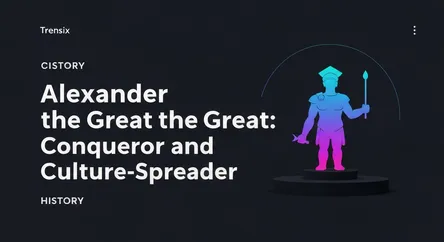History
Alexander the Great: Conqueror and Culture-Spreader

Discover Alexander the Great, the Macedonian king who forged one of history's largest empires and spread Greek culture across the ancient world.
What is it?
Alexander III of Macedon, famously known as Alexander the Great (356-323 BC), was a king of the ancient Greek kingdom of Macedon. Tutored by the philosopher Aristotle, he ascended to the throne at age 20. In just over a decade, he led an unprecedented military campaign, conquering the Persian Empire and stretching his own vast empire from Greece to northwestern India. Undefeated in battle, he is widely regarded as one of the most brilliant and successful military commanders in history. By the age of 30, he had created one of the largest empires of the ancient world.
Why is it trending?
Alexander the Great remains a figure of immense historical fascination. His military genius and battlefield tactics are still studied in military academies worldwide. His life story, filled with ambition, conquest, and drama, continues to inspire books, films, and documentaries. Furthermore, his role in initiating the Hellenistic period—a time of widespread Greek influence and cultural exchange—makes him a pivotal figure in the development of Western civilization. His legacy is a constant subject of academic debate and popular interest, exploring his motivations, character, and the profound impact of his conquests.
How does it affect people?
The legacy of Alexander the Great is profound and far-reaching. His conquests initiated the Hellenistic Age, spreading Greek language, culture, and thought across a vast area. This cultural diffusion, or Hellenization, created a hybrid of Greek and Eastern cultures, influencing civilizations for centuries. He founded numerous cities, most famously Alexandria in Egypt, which became a major center of learning and culture. This spread of Greek civilization laid a cultural groundwork that would later influence the Roman and Byzantine Empires and, consequently, modern Western society.